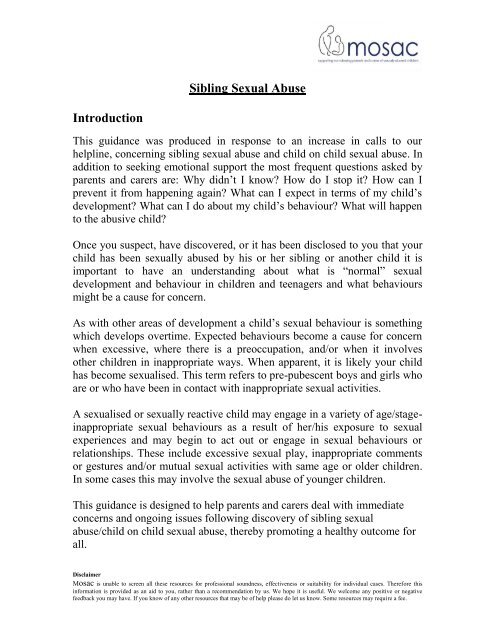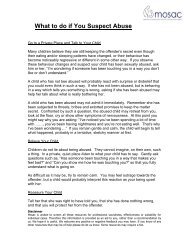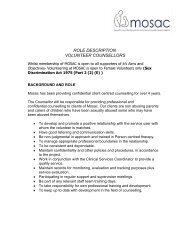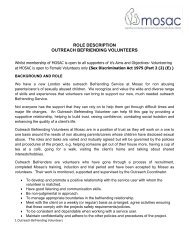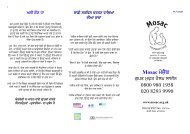Sibling Sexual Abuse Introduction - Mosac
Sibling Sexual Abuse Introduction - Mosac
Sibling Sexual Abuse Introduction - Mosac
You also want an ePaper? Increase the reach of your titles
YUMPU automatically turns print PDFs into web optimized ePapers that Google loves.
<strong>Sibling</strong> <strong>Sexual</strong> <strong>Abuse</strong><strong>Introduction</strong>This guidance was produced in response to an increase in calls to ourhelpline, concerning sibling sexual abuse and child on child sexual abuse. Inaddition to seeking emotional support the most frequent questions asked byparents and carers are: Why didn’t I know? How do I stop it? How can Iprevent it from happening again? What can I expect in terms of my child’sdevelopment? What can I do about my child’s behaviour? What will happento the abusive child?Once you suspect, have discovered, or it has been disclosed to you that yourchild has been sexually abused by his or her sibling or another child it isimportant to have an understanding about what is “normal” sexualdevelopment and behaviour in children and teenagers and what behavioursmight be a cause for concern.As with other areas of development a child’s sexual behaviour is somethingwhich develops overtime. Expected behaviours become a cause for concernwhen excessive, where there is a preoccupation, and/or when it involvesother children in inappropriate ways. When apparent, it is likely your childhas become sexualised. This term refers to pre-pubescent boys and girls whoare or who have been in contact with inappropriate sexual activities.A sexualised or sexually reactive child may engage in a variety of age/stageinappropriatesexual behaviours as a result of her/his exposure to sexualexperiences and may begin to act out or engage in sexual behaviours orrelationships. These include excessive sexual play, inappropriate commentsor gestures and/or mutual sexual activities with same age or older children.In some cases this may involve the sexual abuse of younger children.This guidance is designed to help parents and carers deal with immediateconcerns and ongoing issues following discovery of sibling sexualabuse/child on child sexual abuse, thereby promoting a healthy outcome forall.Disclaimer<strong>Mosac</strong> is unable to screen all these resources for professional soundness, effectiveness or suitability for individual cases. Therefore thisinformation is provided as an aid to you, rather than a recommendation by us. We hope it is useful. We welcome any positive or negativefeedback you may have. If you know of any other resources that may be of help please do let us know. Some resources may require a fee.
(The term “sibling” is used to refer to children who grow up in the samefamily, whether they are stepsiblings, foster siblings, adopted siblings orsiblings by birth. From hereon only the term sibling sexual abuse will beused, but this guidance is also relevant to child on child sexual abuse byother children).What is sibling sexual abuse?<strong>Sibling</strong> sexual abuse as with emotional and physical abuse is an abuse ofpower. For example, a more powerful sibling who is older and/or stronger,who coerces a younger sibling into sexual activity. This may be throughforce, the threat of force, bribes or a promise of special attention or gift tomake the victim keep the abuse secret.<strong>Sibling</strong> sexual abuse does not always involve sexual contact. The oldersibling may force two or more other children to engage in sexual activitywith one another and watch. The older sibling may force a younger siblingto watch sexual activity or pornography. The older sibling may also abuse ayounger sibling by repeatedly watching them in the shower or whentoileting, whilst they themselves don’t want to be watched. The older siblingmay force a younger sibling to watch while they masturbate. All the aboveconstitute sibling sexual abuse.Is sexual curiosity between siblings normal?Yes. A four-year-old girl who touches her baby brother’s penis during anappy change is exhibiting curiosity. A five-year-old year girl who sees herbrother’s genitals for the first time may wonder where her penis is.Likewise, a boy may wonder why he has one. Four and five year olds whoundress to look at each other’s genitals are usually curious. (<strong>Sexual</strong>behaviours that persist and occurs frequently overtime should be examinedcarefully). A twelve-year-old boy who is interested in his five-year-oldsiblings’ genitals is not showing curiositySome questions to ask yourself or a professional are:Is this behaviour what you would expect from a child that age?How long has the behaviour been going on?Does it seem that one of the children involved is being forced toparticipate?Disclaimer<strong>Mosac</strong> is unable to screen all these resources for professional soundness, effectiveness or suitability for individual cases. Therefore thisinformation is provided as an aid to you, rather than a recommendation by us. We hope it is useful. We welcome any positive or negativefeedback you may have. If you know of any other resources that may be of help please do let us know. Some resources may require a fee.
What is the purpose of the behaviour?What sort of sexual behaviours do young children exhibit?Toddlers and young children often touch themselves when naked. They haveno modesty and soon let you know when they develop it. A parent’s reactionwill let them know whether their behaviour is acceptable or not. <strong>Sexual</strong>exploration is part of expected development and it is important that childrenare not be made to feel guilty, dirty, or be scolded for this. Parents shouldfind ways of making it clear that it is private matter.Some examples of behaviours in pre-school children:Appropriate behavioursRubs genitals before going to sleepExplores genital differences between boys and girlsIs interested in watching adults using the bathroomPlays doctors, and other role play activities with other childrenBehaviours that could cause concernFrequently rubs genitalsFrequently exposes genitalsKeeps asking questions about sex after they have been reasonablyansweredPersist in watching adults in the bathroomUses force to get other children to play mummies and daddies,doctors etc, which involves sexual activityPretends to have intercourseAny significant change in behaviour at home or at school (angry,destructive, withdrawn, etc)(If you are unsure about your child’s behaviour, ask a professional)Disclaimer<strong>Mosac</strong> is unable to screen all these resources for professional soundness, effectiveness or suitability for individual cases. Therefore thisinformation is provided as an aid to you, rather than a recommendation by us. We hope it is useful. We welcome any positive or negativefeedback you may have. If you know of any other resources that may be of help please do let us know. Some resources may require a fee.
What is expected sexual development?Early childhood: 0-5 years<strong>Sexual</strong> curiosity, arousal, and behaviour are spontaneously expressedunless the child is taught to inhibit them0-2 year olds engage in simple pleasurable handling of their genitals2-3 year olds may begin masturbatingUnsupervised, play among 2-3 year olds can be sexual but sex play isnot dominant4 year olds are curious about their own and other children’s genitals4-5 year olds like to talk about things that they sense adults wouldconsider dirty or tabooMiddle childhood: 6-9 yearsTend to enjoy rule breaking, including “talking dirty” and get visiblyexcited. <strong>Sexual</strong> language and jokes also increase at this time. Mayperform sexual play on each otherMay talk with caregivers about sex, marriage, pregnancy, and birthContinue to be curious about physical differences; playing “show” and“doctor” to help satisfy this curiosityUnsupervised, sex play may occur. How the sexual activity manifestsitself depends on how much sexual activity the child has observed andhow permissive the society isSex play with older children may occur. Some is pleasant to the child,some is not.Children become interested in girl/boy relationships and may have aboyfriend/girlfriend, but these relationships tend to be short lived withlittle personal involvement. Relationships are predominantly socialrather than sexualMiddle childhood: 10-13 yearsMost children understand the rudiments of sexual intercourse butrelationships are predominantly social rather than sexualDisclaimer<strong>Mosac</strong> is unable to screen all these resources for professional soundness, effectiveness or suitability for individual cases. Therefore thisinformation is provided as an aid to you, rather than a recommendation by us. We hope it is useful. We welcome any positive or negativefeedback you may have. If you know of any other resources that may be of help please do let us know. Some resources may require a fee.
How is normal sexual development disrupted?<strong>Sexual</strong> abuseRegular witnessing of sexual acts between adultsAccess to pornographyParents and carers whose children can access pornographic material runthe risk of having their children imitate adult sexual behaviour and who mayreact by coaxing, manipulating, or forcing younger children into the samekind of sexual behaviour.What factors might contribute to sexual abuse?Neglect<strong>Sexual</strong> activity between siblings may develop in response to unmet emotionaland/or physical needs.Lack of boundaries<strong>Sexual</strong> activity between siblings can develop if parents and fail to respect thechild’s privacy or may result from lack boundaries in terms of age/stageappropriate sexual activities. This can cause children to grow up unawarethat they and others need privacy.Inadequate socialisation<strong>Sexual</strong> activity with younger siblings or other children can result from aninability to socialise or having intimate relations with peers.An older sibling given too much responsibility and powerIt is an important part of family life for older siblings to learn to takeresponsibility for the care of younger siblings and it is important for them tounderstand this has its limits. Parents must ensure they don’t do whateverthey want.DenialDisclaimer<strong>Mosac</strong> is unable to screen all these resources for professional soundness, effectiveness or suitability for individual cases. Therefore thisinformation is provided as an aid to you, rather than a recommendation by us. We hope it is useful. We welcome any positive or negativefeedback you may have. If you know of any other resources that may be of help please do let us know. Some resources may require a fee.
Not being prepared to accept sexual abuse is happening does not causesexual abuse but it may contribute to its continuation.Are there signs that sibling sexual abuse is occurring?When children have been sexually abused or subjected to unwanted sexualattention it is often followed by a change in behaviour. For example, nightfears, anger, aggressive destructive behaviour, cruelty to pets, school refusal,school failure and withdrawal from friendships and activities.What do I do if I discover sibling sexual abuse?Safeguarding the child from further sexual abuse is paramount, and to ensureadherence to Child Protection procedures incidents should be reported toSocial Services and/or the Police. Investigations should determine whetherthe child involved has been sexually abused themselves. In the meantime,you will need to talk to the children involved and you might require practicaland emotional support to do this. In the longer term, a non-intrusivemonitoring of the boundaries imposed on siblings is advised. This is also anappropriate time to discuss with your child the difference between good andbad touch.How do you respond to children who abuse other children?Whilst the behaviour may repulse you and feelings such as anger, hurt andguilt dominate, children who sexually abuse other children should be treatedwith compassion. These children need help just as much as their victims.Children who abuse other children who are not stopped not only hurt otherchildren they may go on to harm themselves. Because they relate to otherchildren in a sexually inappropriate way children who sexually abuse otherchildren are unable to develop real friendships and can become lonely andisolated. This makes its harder for them to stop.Disclaimer<strong>Mosac</strong> is unable to screen all these resources for professional soundness, effectiveness or suitability for individual cases. Therefore thisinformation is provided as an aid to you, rather than a recommendation by us. We hope it is useful. We welcome any positive or negativefeedback you may have. If you know of any other resources that may be of help please do let us know. Some resources may require a fee.
How can parents and carers deal with their own feelings?Finding out your child has been sexually abused by his or her sibling oranother older child is one of the most difficult life experiences you will everhave to face. Shock is a common initial response and for a short periodthereafter denial. For a while you might feel as though you are on a rollercoasterride of unfamiliar and conflicting emotions. If you are feelingoverwhelmed and/or isolated seek professional help.Can sibling sexual abuse be prevented?<strong>Sibling</strong> sexual abuse can happen in any family. Listen to and believe yourchildren, they may be trying to tell you they are being abused. In addition,monitor what your children watch on TV, provide good supervision forchildren when you are not there, teach them the difference between good andbad touch, encourage an open climate for airing and discussing problems,work together to set up a contract stating the rights and responsibilities ofeach child, specify appropriate ways of acting and the consequences shouldabusive behaviour continue or occur in the future and reward sensitive,positive behaviour.Will our family recover?YES! Even if the abuse went on for a long time, with support your childrencan recover. They will need love and understanding and help in sorting outtheir thoughts and feelings. You have already begun this process.BibliographyVernon R. Wiehe, Ph.D. (1996). The Bother/Sister Hurt – recognising theeffects of sibling abuse. The safer Society Press. USA.ReferencesChild <strong>Sexual</strong>ity (from Wikipedia, the free encyclopaedia)http:en.wikipedia.org/wiki/Child_sexualityQuestions and Answers about Sex.http://kidshealth.org/parent/emotions/feelings/sex.htmlDisclaimer<strong>Mosac</strong> is unable to screen all these resources for professional soundness, effectiveness or suitability for individual cases. Therefore thisinformation is provided as an aid to you, rather than a recommendation by us. We hope it is useful. We welcome any positive or negativefeedback you may have. If you know of any other resources that may be of help please do let us know. Some resources may require a fee.
Rich, P. Recognising Healthy and Unhealthy <strong>Sexual</strong> Development inChildren.http://www.selfhelpmagazine.com/articals/child_behaviour/sexdev.html<strong>Sibling</strong> <strong>Sexual</strong> <strong>Abuse</strong>: A Parents Guide (courtesy of Family Services ofgreater Vancouver) http:/www.sasian.org/guide/aguide_en.htmThis document was produced by Marcia Burke (2005).Disclaimer<strong>Mosac</strong> is unable to screen all these resources for professional soundness, effectiveness or suitability for individual cases. Therefore thisinformation is provided as an aid to you, rather than a recommendation by us. We hope it is useful. We welcome any positive or negativefeedback you may have. If you know of any other resources that may be of help please do let us know. Some resources may require a fee.


